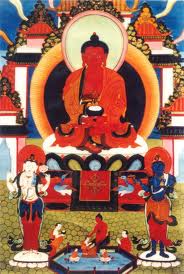Phowa
[[Image:Amitabha.jpg|thumb|250px||Amitabha)]
Phowa (Skt. saṃkrānti; Tib. འཕོ་བ་; Wyl. ‘pho ba) is the practice for directing the transference of consciousness at the time of death, either for oneself or another.
Phowa (Tibetan: འཕོ་བ, Wylie: 'pho ba, Sanskrit: saṃkrānti) is a Vajrayana Buddhist meditation practice. It may be described as "the practice of conscious dying", "transference of consciousness at the time of death", "mindstream transference", or
“enlightenment without meditation” (Wylie: ma-sgom sangs-rgyas). "This controversial esoteric technique (Skt.utkrānti), by which a tantric practitioner is able to sever his connection to the physical body, goes by the Indian reference to 'yogic' or spiritual suicide
The consciousness may be transferred to the dharmakaya nature, to a pure realm such as Sukhavati or to a favourable existence in the human realm.
The practice is one of the Six Yogas of Naropa, but is also to be found in many other lineages and systems of teaching, including the Longchen Nyingtik and Namchö cycles.
Although it is included among the so-called 'five practices of enlightenment without meditation, it does require a thorough training before it can be put into effect successfully.
Moreover, the teachings advise that phowa for others should only be undertaken by someone who has reached the path of seeing.
Subdivisions
Tsele Natsok Rangdrol lists five kinds of phowa:
|
Patrul Rinpoche mentions another list of five kinds of phowa: Superior transference to the dharmakaya through the seal of the view
|
